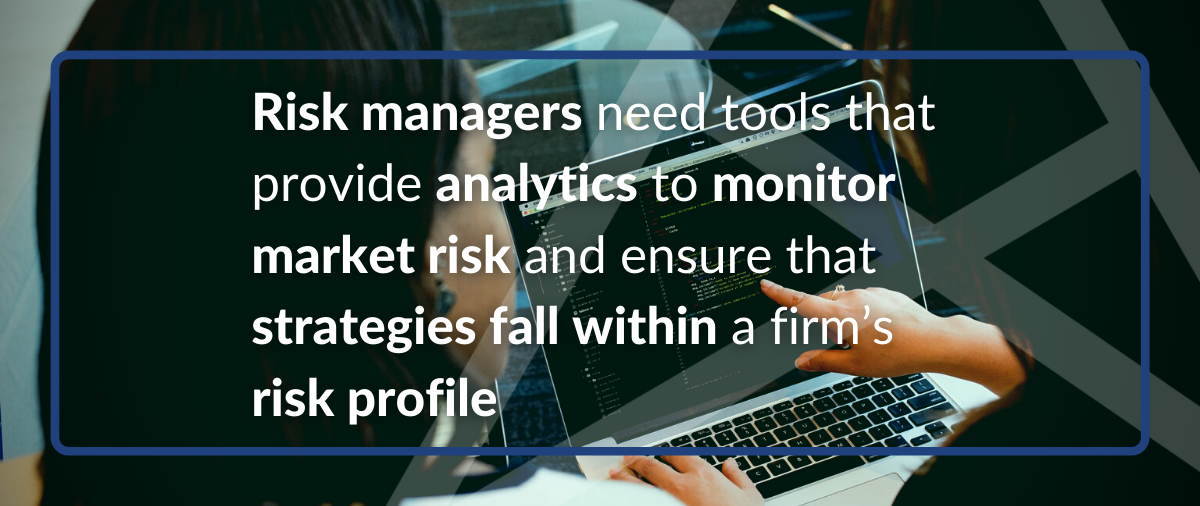Financial firms face many different types of risk, from regulatory, liquidity, legal, and reputational to operational, financial, and market risk. Every firm devotes significant resources, both human and financial, to managing and mitigating these risks. Our latest insight examines the types of risk that risk management teams encounter, the approaches they use to mitigate these risks, and the role software can play to enhance risk management and mitigation processes.
Risk management plays an overarching role to address the totality of a firm’s risk exposure
While each functional area has processes and procedures in place to manage its specific risks, the role of risk management is to understand the totality of risk related to business activities and proactively establish controls. These controls are intended to defend the firm against legal actions, regulatory violations, reputational damage, financial losses, and investor harm.
Market risk can expose firms to potentially catastrophic losses if not tightly managed
Market risk is a considerable concern for risk managers, as significant losses can threaten everything from a firm’s reputation and credibility to, in the worst case, its very existence. Risk managers need tools that provide analytics to effectively monitor market risk and ensure that strategies fall within a firm’s risk profile. Two such tools include stress testing and Value at Risk.
Risk managers can use these tools to understand the magnitude of likely losses under different scenarios, or how a portfolio or position will react to different moves within the larger market. Ultimately, these measures give risk managers the ability to better understand and spread awareness of market risk considerations throughout a firm.
Operational / Process-Oriented Risk is another major concern for Risk Managers
Risk management teams must also ensure that processes, from formulating an investment thesis to carrying out reconciliation and reporting, are well thought out and understood by multiple team members. Teams need to understand all these processes in detail and see how they fit into the larger workflow. Critically, teams should know how these processes respond to systemic failures and understand the implications for risk exposure.
The use of Excel and Macros remains all too common in the financial services industry. Risk management teams should encourage different functional areas within an organization to move away from manual Excel or macro-based processes, as they tend to rely on a small number of individuals and increase key-man risk. The role of risk management is to advocate for solutions that are more robust or framed in nature.
The right software can make risk management not only more effective but easier as well
Risk Management professionals can rely on software to help execute broad responsibilities and provide more insights on market and operational risk. That said, not all software is created equal. Take VaR or Stress testing software for example – some may allow risk professionals to load in portfolios and generate analytics, while others may offer more sophistication whereby analytics are automatically generated and only those portfolios above a preset parameter are flagged. Risk management professionals need to determine what functionality is best for them and their organization – both now and in the future.
Workflow solutions, like Theorem’s allocation and matching modules, can replace excel macro-based processes and ensure that processes are documented and repeatable – reducing the risk that knowledge is concentrated in a few key individuals. Moreover, these kinds of advanced tools create efficiencies (such as lower costs) and give time back to team members to focus on other core competencies.
With all these benefits, a software solution can significantly enhance your risk management capabilities while adding value across the full range of back-office processes. Please contact us if you’d like to learn more about what Theorem can do to help you elevate your risk management and back-office processes.
___
About the Author
Rebecca Baldridge, CFA, is an investment professional and financial writer with more than 20 years of experience in creating content and research for asset managers, investment banks, brokers and other financial services clients. She’s worked for some of the biggest names in the industry, including Merrill Lynch Asset Management, JP Morgan Asset Management, BNY Mellon and Franklin Templeton. Rebecca also spent 9 years as an analyst and director of equity research in Moscow, working for several Russian banks. In late 2019, she founded Quartet Communications, a boutique communications firm serving financial services clients. Her writing has been published in outlets including Pensions & Investments, MSNBC.com, Inc. magazine, and Investopedia.com. She holds a B.A. in Russian from Purdue University and an M.S. in Finance from the Krannert Graduate School of Management at Purdue.
